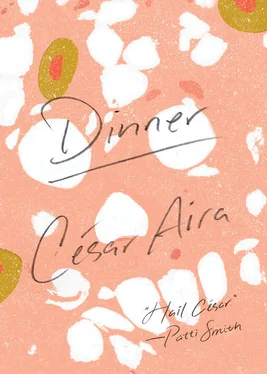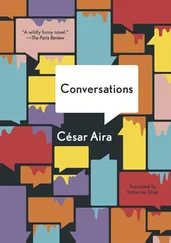I stayed in bed for a while. It wasn’t even late; it was early; I wouldn’t be spared a single drop from the overflowing cup of afflictions. I remembered the old Catalan saying about the three things you can do in bed: “Pray to God, fantasize about your future prosperity, and scratch your butt.” I was never any good at fantasizing, so I didn’t have even that source of comfort; any compensatory flights of imagination were always downed by a well-aimed shot of reason as soon as they took off. I had fully incorporated the prosaic reasonableness of my fellow townsfolk, but in a way that was useless for conducting business. In solitary contemplation I managed only to amass self-recriminations for my failures, reliving them, and making myself even more depressed. There did exist, however, the possibility that my situation was simply a matter of bad luck. In other words, it might depend on chance. If this were the case, the bad luck could vanish the same way it came, and I didn’t need to consider myself a failure. Maybe I was just going through a losing streak, and once it passed, things would turn around for me. The famous “seven years”… I preferred not to count up my years of misfortune, since I suspected there were more than seven. I didn’t remember breaking any mirrors, but maybe I had without realizing it. Anyway, it doesn’t matter, because that’s just a crass superstition. When people say that breaking a mirror brings seven years of bad luck, a fiction is created and chaos is geometrified; luck varies, and in the course of a year (why am I saying a year? a day, an hour) there can be many turns of the dial from good to bad and vice versa. It’s true that sometimes there are losing streaks, longer or shorter, and even if this supposed streak of seven years is very long, almost excessively long, it remains within the limits of the possible. During that interval, the magical power of a broken mirror holds all variations in suspense — luck ceases to be luck and everything turns out badly. But once those seven years are over, luck has no reason to necessarily become good luck; it becomes just plain luck — changeable, voluble, good and bad. And subject to streaks. And immediately after the term is over, there can come — why not? — a streak of bad luck, which can last a month, a year, five years, fifty-five years. In the end the solution was not to either trust luck or not.
Finally, I got up and got dressed. I would have liked to go out, to see how people were recovering from the night’s ordeal, but in the end I didn’t. My mother had gotten up before me, and as soon as she saw me cross the threshold of my bedroom, she asked me if the food had “agreed” with me. Had it “agreed” with me? Yes. Or: not yes or no. It hadn’t “agreed” with me or not. I’d eaten it and forgotten about it. I didn’t say anything, but she didn’t care, because she had asked me that only so she could tell me that it had disagreed with her, that she was nauseated and disgusted. What was that he fed us? What was it called? Had I liked it? She’d eaten it so as not to be rude, and now she was regretting it. She’d had to drink some boldo tea as soon as she got up, and her stomach was still upset.
She kept being bellicose. Everything about our dinner had been bad for her, and the food couldn’t be an exception, but in reality it was an excuse to speak badly of what really seemed bad to her, which was my friend himself, his house, his collections, his life, his existence (in contrast to mine). The topic filled her to the brim, and gave her a lot to say. In that sense, and only in that one, the dinner had been good for her, because it allowed her to relaunch her newly inspired and persuasive discourse.
Her idée fixe was that I was not a failure, that I had no reason to be dissatisfied with my life, that I could be happy, and that in fact I was. According to her, I had always done the right thing, and I continued to do so; I was an exemplary man, a role model, and, moreover, I was young, good-looking, and intelligent. The objective facts contradicted her categorically: I was approaching sixty; I was fat, wrinkled, stooped; I was alone, without any family (except her), or money, or work, or a future. Mother overcame this discrepancy by closing her eyes to reality, and since this didn’t suffice, she blamed the rest of humanity. In other words, she didn’t “blame” but rather limited herself to criticizing, to finding defects, to seeing everything bad about everybody; the comparison to me was implicit, as it was implicit that I couldn’t hope for anything good to come out of the contrast, and if anything bad had happened to me, the fault lay in those degenerate and evil others who surrounded us. But she also didn’t admit that anything bad had happened to me: I was just fine where I was, things in my life had turned out well and would get even better in the future. In short, a complete denial of reality was in play. And her life was reduced to that denial; I had reduced her to that. Her maternal instincts had always been strong; the years and the horrendous unreality of my life had twisted her into this caricature.
She returned to the same topics as the night before. What did my friend want with all that junk he’d collected? He was broke, he had nothing but debts. And that useless garbage must be very expensive, it must have cost him an arm and a leg… She looked at me, seeking affirmation. That was the worst part for me: being part of a dialogue that wasn’t a dialogue, participating in a conversation that had no room for me. I told her that he would have bought some of those objects more cheaply, others more dearly. And I added that in any case, they were an investment. They had value. He could sell them if he wanted to.
Then came the sneer I knew so well. Who was he going to sell them to!? Who would want such atrocities!?
It was typical. One of the contradictions I had to get used to: I was always right except when I talked to her, and then I wasn’t, no matter what I said.
In this case, Mother was being guided by the mind-set of the town, the people she knew, her world, in which nobody would ever spend a single cent on an antique or a curio. A practical, concrete, reasonable, anti-aesthetic, wholesome world.
She returned to the subject of the atlas. Before she returned to it, I realized she was returning to it, from the glance she threw into a corner of the apartment where she kept her own atlases, the ones she consulted when she did crossword puzzles; there were two or three old, shabby ones (one of them she’d bought for me when I was in school), but of a reasonable “normal” size. It was the abnormality of my friend’s inordinately large atlas that had impressed her, not its antiquity. Curiously, it was the antiquity that could have impressed me, for a very specific reason. Without being an intellectual, or anything of the sort, or having the least interest in politics, I kept myself up-to-date on the names of countries and their disintegration; it was a kind of loyalty to my childhood pleasure of drawing maps at school, and making each country a different color. If I’d told Mother that her maps were out-of-date, she would have answered that my friend’s inordinately hefty volume should be even more so; and it wasn’t worth telling her that seeing as how all countries were now returning to their old borders, that antique atlas might end up being more up-to-date than hers, which were simply out-of-date.
But the fact was, she didn’t talk about the atlas, though I’m certain she intended to; she was distracted by an association of ideas wherein she found a more dramatic thread: she said she’d had nightmares all night long. It was so obvious, the least one could expect, after a visit to my friend’s house, that museum of horrors. I immediately thought of the elephant mask, and I almost thought I saw that beastly image floating in the blackness, a vengeful Ganesha, soon transformed into a monster (I was also making my own associations, but I didn’t realize it at the moment).
Читать дальше












